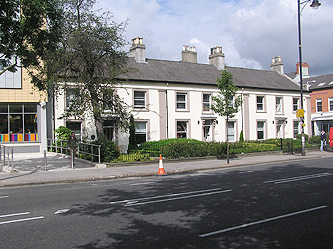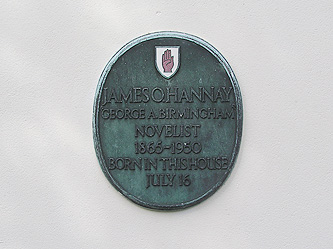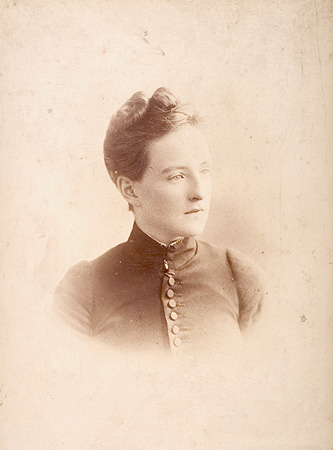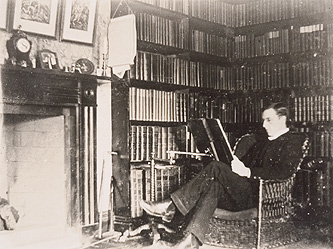George A. Birmingham is the pseudonym of James Owen Hannay. He was born on July 16, 1865, in Belfast, the capital of Northern Ireland. Today the house where he was born is a part of the administration building of the Queen’s University of Belfast. It is located on University Road across from the university. On the wall of the house there is a memorial plate which says, “James O. Hannay, George A. Birmingham, Novelist, 1865-1950, Born in this House, July 16”.
 Behind the tree on the left is the house where Birmingham was born. (Belfast)
Behind the tree on the left is the house where Birmingham was born. (Belfast) A memorial plate dedicated to Birmingham (Belfast)
A memorial plate dedicated to Birmingham (Belfast)At the time when Birmingham was born, the whole island of Ireland was under British rule and there had been a long-lasting conflict between those who claimed that Ireland should stay in Britain and those who insisted Ireland should be free from Britain. Most of the pro-British were immigrants from Britain and their descendants. They were mainly Protestants and called Unionists. On the other hand, most of the pro-Irish had their origins in Ireland. They were mainly Catholics and called Nationalists.
Birmingham’s parents were of British origin. His paternal grandfather had immigrated from Scotland to Northern Ireland and married a local woman whose parents also had come from Scotland. They settled themselves in the suburbs of Bushmills, which is famous for whiskey. Birmingham’s father, Robert Hannay (1835-1894), was born there. Later he moved to live in Belfast and gave services as a Church of Ireland clergyman in St. Anne’s Church, today’s St. Anne’s Cathedral, which is located near the city center. (http://www.belfastcathedral.org)
Birmingham’s maternal grandfather was also of Scottish origin and had performed his duty as a Church of Ireland clergyman for 37 years in Moira, a small town southwest of Belfast. Therefore Birmingham’s family was traditionally Unionist and supported British rule over Ireland. In his autobiography, Pleasant Places (1934), Birmingham recounted an episode showing his father’s bigoted allegiance to Britain. When Birmingham was still an infant, his father hired as his private tutor the leader of the Orange Order of Northern Ireland, which was the extreme wing of Unionists. This man, Dr. Drew, put Birmingham on his knees and tried to make him say repeatedly, “No Pope, no priest, no surrender, Hurrah!” Although Birmingham never had sympathies with Unionism in later years, his mind was imbued with “the spirit of defiance and detestation of authority”, which inspired Northern Irish Unionists. Indeed, in his speeches and writings, Birmingham displayed the spirit of defiance and detestation of both the authorities of Unionism and Nationalism so clearly that he was often misunderstood and denounced by both Unionists and Nationalists.
Birmingham received his school education in England. He entered Temple Grove School near the River Thames at the age of nine, and later studied at a public school called Haileybury School. Then he returned to Ireland to enter the Divinity School of Trinity College, Dublin. The university had been founded by the Queen of England, Elizabeth 1, in 1592 for the inhabitants of English descent.
After graduating from the university in 1888, Birmingham was ordained and started working as a curate for Delgany, Co. Wicklow, a seaside town south of Dublin. Today, in the Church of Ireland of this town, you can see a memorial plaque which says, “James Owen Hannay: Pastor, Scholar, Author who wrote as George A. Birmingham entered upon his ministry as curate of this Parish 1888 – 1892”.
In 1889 Birmingham married Adelade Wynne, daughter of Frederick Richards Wynne (1827—1896), a Church of Ireland clergyman who was to become a bishop.
 Birmingham’s wife, Adelade, known as Ada
Birmingham’s wife, Adelade, known as AdaHowever Birmingham's salary as a curate was quite small and the couple lacked the money to pay their coal bills. To make up for a deficiency in their living Birmingham wrote a short story and sent it to a London publisher. It was accepted for publication and he received a check of £10. Then another London publisher who read the story asked him to write a long novel. But, soon after he started writing the novel, the publisher went bankrupt and it was never to be published. On his wife’s advice, he gave up writing fiction and committed himself to the study of Christian theology with her. This bore fruit as the two publications; The Spirit and Origin of Christian Monasticism (1903) and The Wisdom of the Desert (1904).
(http://www.nd.edu/Departments/Maritain/etext/
wd.htm)
It was in his next parish, Westport, Co. Mayo, that Birmingham made his debut as a novelist. In 1892, Birmingham left Delgany for Westport to become a rector. Today the town facing the Atlantic Ocean is one of the most famous tourist resorts in Ireland, which takes a little over than three hours to get to from Dublin by express train. Birmingham founded a literary circle in Westport, of which most of the members were Anglo-Irish Protestants like him. At one of their meetings, Birmingham’s wife, Adelade, known as Ada, spoke with admiration about the literary merits of poems by the Young Irelanders who had fought for an independent Ireland. She had no political intention. There happened to be a member present who was a yachting friend of Birmingham’s and a supporter of the Nationalist cause. He praised Ada’s speech vehemently, which caused a sense of resentment among the other members. Then Birmingham read a poem by Clarence Mangan, a Young Irelander poet, expecting that its musical beauty would expel the sense of resentment. But it produced a counter effect and the Anglo-Irish members felt something more than resentment towards Birmingham. This incident marked the beginning of Birmingham’s connection with Irish Nationalism. He embarked on studying Irish history and learning the Irish language.
Birmingham sympathized with the Gaelic League founded by Douglas Hyde (1860-1949) in 1893. Like Birmingham, Hyde was of British descent and his family had their faith in the Church of Ireland. Hyde also studied at Trinity College, Dublin. The Gaelic League aimed for the regeneration of the Irish language, culture and literature in order to establish Ireland’s own identity which was different from England’s. It started as a non-political organization.
As Birmingham wrote numbers of articles to defend the cause of the Gaelic League in The Church of Ireland Gazette (http://www.gazette.ireland.anglican.org/) and other organs, he was criticized and denounced by many Protestants and Unionists. Those articles drew Hyde’s attention and he visited Birmingham’s house in Westport in 1904 to ask him to join the executive of the League. Birmingham accepted Hyde’s offer and became its member through the League election. At the same time, Birmingham decided to write novels again to support his increasing family.
 Birmingham at Westport Rectory
Birmingham at Westport Rectory| << BACK | NEXT >> |